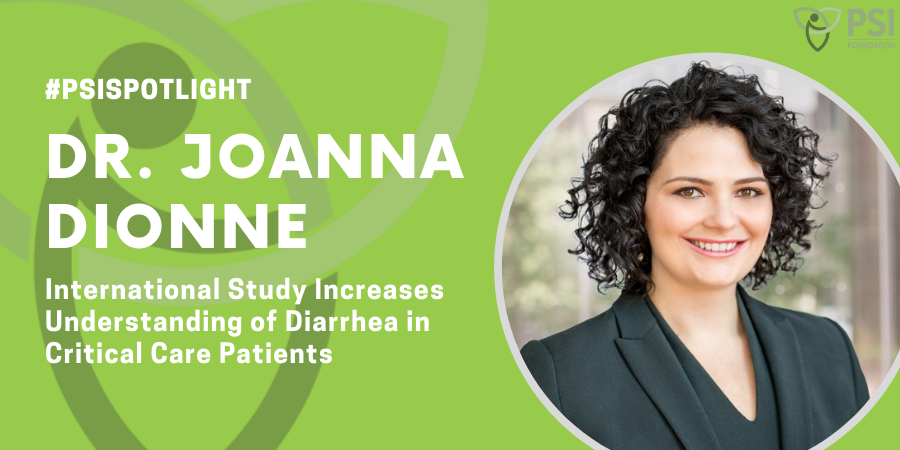A clinical study supported in part through PSI has examined one of the most common complications faced by patients in critical care – diarrhea. Dr. Joanna Dionne, who is leading the Diarrhea, Interventions, Consequences and Epidemiology in the Intensive Care Unit (DICE-ICU) study, says that PSI support was essential to the study, which aims to improve care for patients experiencing diarrhea while in the ICU.
“My Resident Research Grant from PSI was truly transformative. It provided not only financial support, but also encouragement that my physician community in Ontario believed in me and this research,” she says. “This topic may not be ‘flashy,’ but diarrhea certainly affects many critically ill Ontarians, and we could certainly change care and impact our patients if we understood it better.”
Dr. Dionne is a gastroenterologist, intensivist and internist at Hamilton Health Sciences and assistant professor at McMaster University. As a trainee in critical care with her mentor, Dr. Deborah Cook, she realized that not much information was available about the incidence of diarrhea in the ICU and its causes.
This realization eventually led to the DICE-ICU pilot study, a prospective cohort study to establish the prevalence of diarrhea in patients in critical care, identify risk factors and document its consequences on clinical decisions and outcomes. The pilot study began with four sites in Ontario, then added two sites in the US. In 2016, Dr. Dionne received a PSI Resident Research Grant to expand the study to another three Ontario sites, which mean that nearly 900 critical care patients in total participated in the study.
Residents are the principal investigators on PSI Resident Research Grants, helping them gain key research skills to help prepare them for careers as independent clinician scientists.
“Early support will make or break someone’s career and will lead them to becoming a researcher or not,” says Dr. Dionne. “It’s not just about the science, but also getting experience with the administrative work of leading a study that is so vital for your career development. It’s absolutely fundamental.”
DICE-ICU study will provide foundational information about understudied topic
The DICE-ICU pilot study used three different definitions of diarrhea to estimate the incidence in critical care patients, which ranged from 40% to 77% depending on the definition. It also identified the risk factors most strongly associated with diarrhea, which included the number of days a patient was prescribed antibiotics. And, importantly, the study suggested that Clostridium difficile, which has been thought to be major cause of diarrhea in critical care patients, is actually responsible for only a small proportion of cases.
Based on these pilot results, Dr. Dionne initiated a larger DICE-ICU study, which includes more than 1,000 patients at 12 centres in four countries – the largest study of its kind in the world. The results will provide foundational information on the cause and impact of diarrhea in the ICU and may influence treatments that increase risk of diarrhea, such as antibiotic prescribing and enteral feeding practices in ICU patients.
In 2019, Dr. Dionne received a PSI Research Trainee Award, a two-year award that provides support to protect 75% of her time for research and allowed her to further the DICE-ICU study.
“The funding I received from PSI has been the building blocks of a research program that otherwise may not have been funded,” she says. “And importantly, PSI is able to support you as you grow as an investigator. It supports junior and early career investigators and has different programs to support you over time. That longitudinal support is absolutely transformative.”
Dr. Dionne says that it was challenging to get the DICU-ICU study underway, in part because there hasn’t been much interest in studying diarrhea in critical care patients or recognition of its clinical importance. But mentorship from Dr. Cook and support from PSI encouraged her to continue pursuing this question. This support inspires her to give back to younger trainees now and in the future.
“It makes me want to give back to my province, to PSI which has been incredibly instrumental to my career, and to give those opportunities to the next generation of young investigators,” she says.
Despite the challenges young clinicians may face, especially when trying to undertake a new research program, she encourages them to persevere to examine important clinical questions that can change patient care.
“It’s a true honour to work with patients and serve my community and my province, but when you’re working at the bedside, there’s always a question you cannot answer. That curiosity always drives me back to research,” she says. “As a physician, I can do my best for my patients, but as a researcher I can help patients that I will never meet, and I think that’s pretty powerful.”



